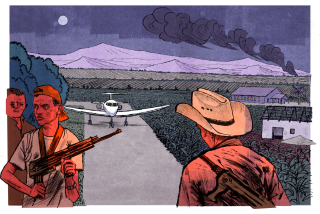Onslaught of Media’s Reaction Recalls the Rodney King Case
Compelling videotape of alleged police brutality has again demonstrated television’s appetite for such imagery, broadcast news’ ability to help set the political agenda and, critics say, its potential through repeated exposure to inflame such situations.
Television’s use of home video that shows an Inglewood police officer slamming handcuffed teenager Donovan Jackson onto the trunk of a patrol car and then punching him in the face has spurred the Justice Department to say it will investigate the matter, fueled outrage among community activists and filled talk radio with hours of debate.
At the same time, the coverage is already prompting discussion about the media’s role in such events, as well as warnings about the need for journalistic restraint. In that respect, the Inglewood case--and a separate event this week in Oklahoma, involving footage of white police officers beating a black suspect--has raised comparisons with the media furor that surrounded the 1991 beating of motorist Rodney King, which, after repeated television exposure, stoked the anger that helped lead to the Los Angeles riots.
The Jackson videotape, recorded by onlooker Mitchell Crooks, has played repeatedly on local TV stations and all-news cable networks.
CNN, for example, covered the story extensively this week.
As with the King case, media observers say that what sets these stories apart from the other charges of police brutality leveled every year is the availability of striking pictures to tell the story.
“Almost certainly, the video drives this coverage to a greater degree than the story would get otherwise,” said Bob Steele, director of the ethics program at the Poynter Institute for journalism studies. The video provides the visual storytelling that TV demands, he said.
Although activists and some callers to talk radio have cited the video as conclusive evidence of brutality, some caution that the images need to be viewed with skepticism.
Keith Woods, another Poynter professor who specializes in coverage of race relations, recalled an incident several years ago in Philadelphia in which TV news aired footage of a fraternity party that got out of hand. Over the next several days, more videos surfaced from different angles, and “what first appeared to be a pretty flagrant act of police brutality turned out to be a much more nuanced,” he said.
As a result, Woods said, journalists should be cautious not to promote such tapes “as if it’s the be-all and end-all of smoking guns.”
Experts say such excessive promotion by TV outlets can skew the public’s perception of the tape’s news value.
Steele added that there is extra reason for caution “when the video comes from a non-journalistic source.”
Academics note that such stories would often benefit from waiting until journalists have time to gather more facts, but that seems increasingly unlikely in the current, highly competitive news landscape, which puts an enormous premium on immediacy.
Both Fox News Channel--currently the most-watched cable news network--and MSNBC started in 1996.
Despite competitive pressures, broadcasters insist they have been responsible in addressing the story. On Thursday, KABC-TV’s “Eyewitness News” was preparing a piece comparing the Inglewood case with the footage of the King beating.
“The story is still so fresh, and there are so many questions about what happened, that we want our viewers to make their own judgments,” said KABC news director Cheryl Fair.
Fair added that she did not want the footage to become a generic tape that would be played with every new development. “There has to be a reason for running it--we don’t want to be gratuitous with it,” she said.
Ratio talk shows have weighed in regularly on the Inglewood story, with most local hosts arguing against condemning the police officers without additional facts.
“The tone that we’ve taken is, we need to remain calm at a very emotional time,” said Erik Braverman, program director at talk-radio station KABC-AM (790) in Los Angeles.
More to Read
Start your day right
Sign up for Essential California for news, features and recommendations from the L.A. Times and beyond in your inbox six days a week.
You may occasionally receive promotional content from the Los Angeles Times.







